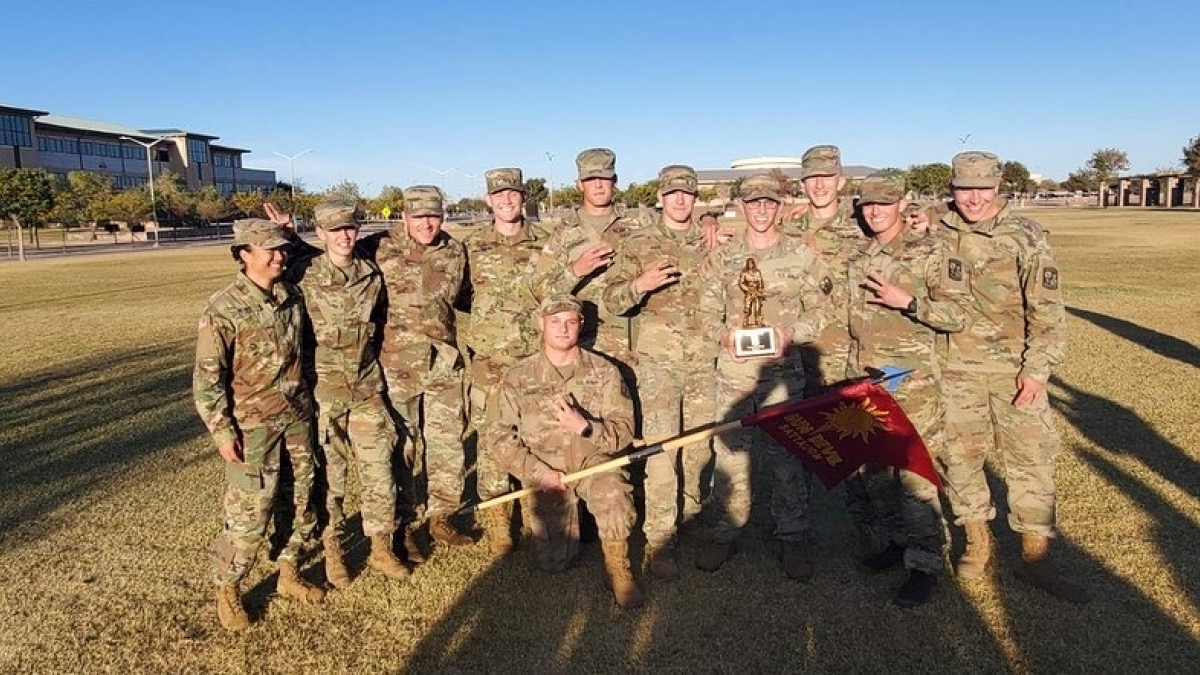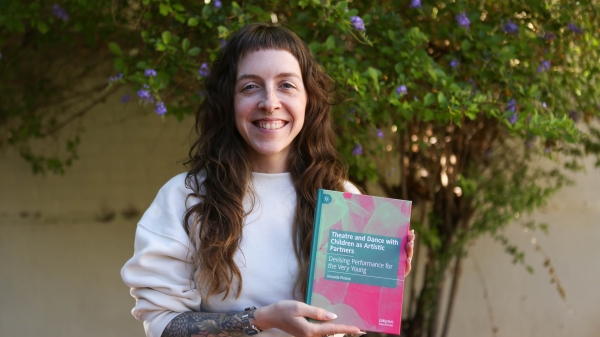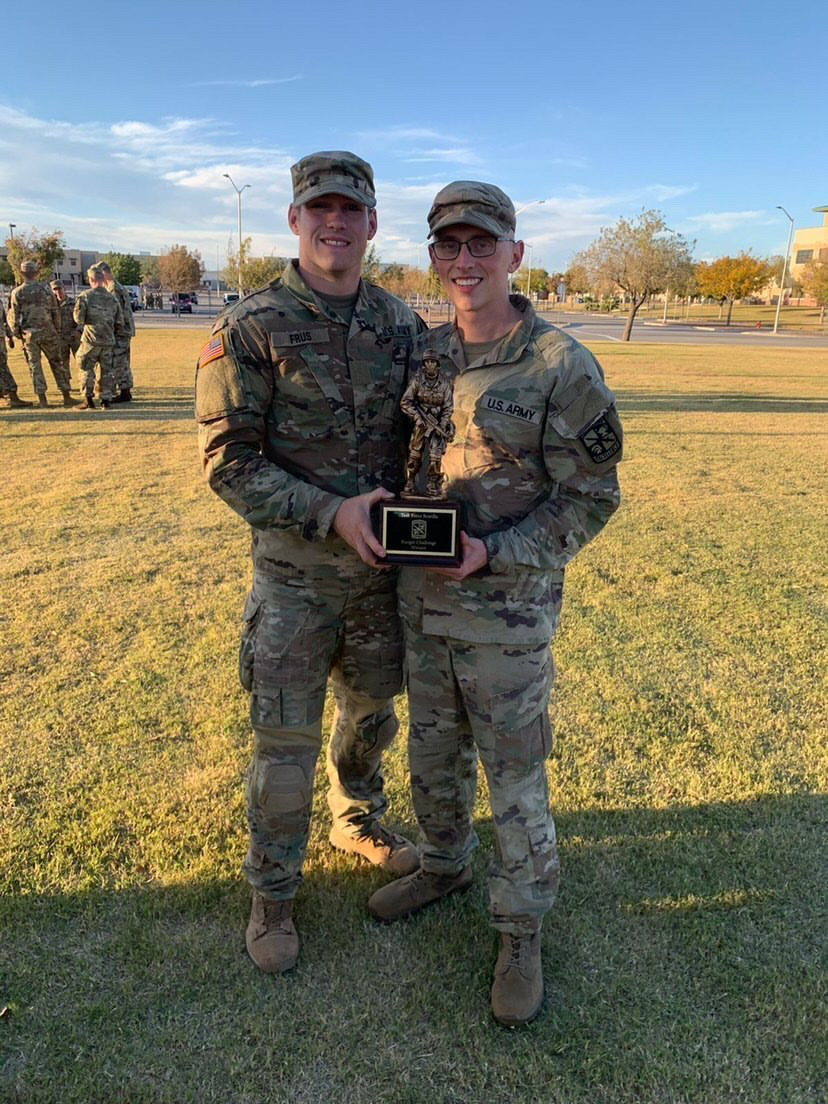Sun Devil Battalion wins regional Ranger Challenge Competition, places 5th overall

The Sun Devil Ranger Challenge team poses with the battalion guidon after being named winners of the regional Ranger Challenge Competition. Photo courtesy of ASU Department of Military Sciences
This fall, Arizona State University’s Sun Devil Battalion participated in the Ranger Challenge Competition, a two-round varsity sport where Army ROTC teams from across the country compete in events that test mental and physical toughness. The team placed first in the regional round and fifth in the overall competition.
“I am extremely proud of the way the team came together and executed. From the beginning this team had a mindset that they would go to this event and win, and they went out and did it,” said Capt. Tyler Alavekios, an assistant professor in the Department of Military Sciences. “Nearly all the members had never competed before, so no one really knew what to expect from the event. The win validated the focus and effort our team has put into not only training the team but into how we train cadets.”
The challenges the cadets participated in included basic rifle marksmanship, an Army physical fitness test, a written navigation test, day and night orienteering and a grenade assault course. Each team that participates is awarded points based on how well they perform in each event.
The first round of the Ranger Challenge took place at Fort Bliss in Texas from Oct. 22–23. The Sun Devil Battalion was one of eight teams competing from Arizona, New Mexico and Texas. In this round, the Sun Devil Battalion placed first and was one of two teams from the region to move on to the second and final round. This was the first regional competition win for the team since 2009.
The final round was held at Camp Gruber in Oklahoma from Nov. 5–7. There, the Sun Devil Battalion placed fifth among 10 teams from Arkansas, Arizona, Colorado, New Mexico, Oklahoma, Texas, Utah and Wyoming.
The Sun Devil Battalion’s Ranger Challenge team was made up of seven students from ASU and four from Grand Canyon University.
“In less than a week, the team quickly developed trust, confidence and cohesion to excel during their competition during physical and marksmanship events,” said Lt. Col. Erich Schneider, a professor in the Department of Military Sciences for ASU and GCU Army ROTC.
Jack Frus, a third-year student double-majoring in civic and economic thought and leadership, and political science, with minors in history and military leadership, was part of the Sun Devil Battalion’s Ranger Challenge team and has previously participated in the Ranger Challenge.
Jack Frus (left) and Dane McCall hold the Task Force Jicarilla Ranger Challenge Competition trophy. Photo courtesy ASU Department of Military Sciences
He said this year's competition was more than just a physical and mental challenge for him.
“Participating in the Ranger Challenge allowed me more time to hone in on my skills as a soldier and put them to the test. It also allowed me to build better camaraderie and trust with my fellow cadets,” Frus said. “My favorite part of the Ranger Challenge was the shared experience between myself and the other cadets in the challenge. We built strong bonds through intense training and rigorous competitions. In stressful situations, trusting one another is the key to success when under extreme pressure.”
Frus, who hopes to serve in the Army Special Forces and eventually hold a leadership position within the government, said participating in the Ranger Challenge has helped prepare him for his future.
“The Ranger Challenge also gave me a better understanding of basic soldiering skills that will aid me in my career,” he said. “I would recommend the Ranger Challenge to anyone who wants to serve in a combat-arms role in the Army, or even for anyone who wants to challenge themselves in a new way.”
The goals of the Ranger Challenge center on developing leaders while fostering teamwork, a sentiment that is similarly at the heart of ASU’s Army ROTC program.
“By having cadets participate in the Ranger Challenge, we increase our ability to generate quality leaders of character for our university, community, state and nation,” Schneider said. “I am confident that our cadets built trust and confidence in one another that will serve as the foundation for many more competitive teams to come in the future of the Sun Devil Battalion.”
More Arts, humanities and education

Exhibit to feature artwork inspired by oral histories from Arizona's oldest botanical garden
Though it is Arizona's largest botanical garden and has been an established touchstone of the community for more than 100 years,…

ASU center to host Spike Lee for Delivering Democracy 2025 program
The Center for the Study of Race and Democracy at Arizona State University will host Academy Award-winning filmmaker and cultural…

ASU professor explores theater, dance for young children in new book
Arizona State University Assistant Professor Amanda Pintore believes in the artistic capacity of very young children. She's…
